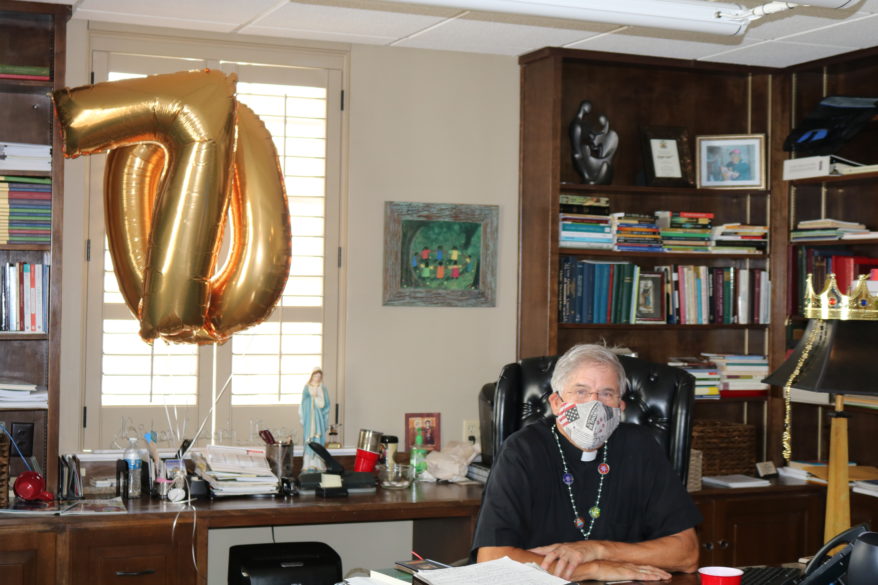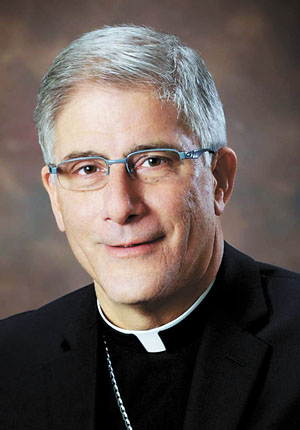Por Obispo Joseph R. Kopacz, D.D.
Durante el mes de octubre celebramos el Respeto por la Vida, una realidad que fomentamos como católicos y discípulos del Señor Jesús todos los días del año, pero con un mayor enfoque en este mes.
A principios de este mes, celebramos la vida de dos santos notables, Teresa y Francisco, y entre ellos se encuentra la conmemoración de los Ángeles de la Guarda. Sin duda, Teresa de Lisieux y Francisco de Asís mantuvieron la integridad de nuestra tradición de fe como guardianes del Evangelio y luces orientadoras para un encuentro con Jesús de Nazaret, el Señor de la historia.

Los Ángeles de la Guarda proporcionan una lente maravillosa a través de la cual podemos profundizar nuestro compromiso con la vida y el misterio de la gloria de Dios, presente en todas partes. En una ocasión en que Jesús estaba enseñando, aprovechó la oportunidad de dar la bienvenida a los niños y de revelar el ministerio de los ángeles de la guarda en el plan de salvación de Dios. “No desprecien a ninguno de estos pequeños. Pues les digo que en el cielo los ángeles de ellos están mirando siempre el rostro de mi Padre celestial.” (Mateo 18:10)
Inmediatamente antes de esta maravillosa revelación, Jesús declaró con ardor que “ si ustedes no cambian y se vuelven como niños, no entrarán en el reino de los cielos.” (Mateo 18:3) En otras palabras, nuestra visión se atrofiará, seremos incapaces de ver la gloria de Dios en el rostro de Jesucristo y nuestra capacidad para abrazar y respetar la vida disminuirá. Siempre que la oscuridad eclipsa la bondad de la creación de Dios, es trágico, porque cada día debemos ser guardianes del mundo que se nos ha confiado, especialmente en nombre de la vida humana.
La iglesia sigue siendo guardiana ferviente de la vida por nacer, un compromiso que se remonta a las fuentes más antiguas de nuestra tradición católica. Es la plenitud del entendimiento de las palabras y los gestos del Señor para abrazar y acoger al pequeño porque al hacerlo vemos la gloria de Dios en el rostro de la vida del recién nacido. En nuestra oración y enseñanza, en nuestra defensa y amoroso servicio, hemos sido fieles guardianes de la vida en el útero con el más profundo respeto. Este es el fundamento de la vida y debe asentarse sobre la roca del plan de Dios, no sobre la arena de una cultura de usar y tirar.
Sobre esta base, la iglesia católica en todo el mundo, en nuestra nación y en nuestra diócesis trabaja incesantemente por una mayor justicia y decencia a lo largo de la vida y en todos los contextos sociales, nuevamente a través de la oración y la enseñanza, la defensa y el servicio amoroso. Abrazamos la comunidad, la solidaridad y el bien común. Nos esforzamos por ser fieles guardianes para asegurar que una estructura sólida de justicia y paz se asiente sobre una base firme de vida.
A lo largo de este mes destacaremos y celebraremos mucho de lo que se hace a favor de la vida, evidencia de que somos miembros de la familia de Dios. “Por eso, ustedes ya no son extranjeros, ya no están fuera de su tierra, sino que ahora comparten con el pueblo santo los mismos derechos, y son miembros de la familia de Dios. Ustedes son como un edificio levantado sobre los fundamentos que son los apóstoles y los profetas, y Jesucristo mismo es la piedra principal. En Cristo, todo el edificio va levantándose en todas y cada una de sus partes, hasta llegar a ser, en el Señor, un templo santo. En él también ustedes se unen todos entre sí para llegar a ser un templo en el cual Dios vive por medio de su Espíritu.” (Efesios 2:19-22)
Un componente clave de nuestro respeto por la vida en estos días es nuestra vigilancia constante durante la pandemia. Aunque la dispensa de la Misa dominical todavía está en vigor, el mandamiento de santificar el día del Señor nunca se dispensa. Ya sea en casa o en la iglesia, sean fieles guardianes de su fe. Sepa que nuestras iglesias mantienen el estricto protocolo de desinfección, distanciamiento y uso de máscaras. Esto también es respeto por la vida de los demás. Para terminar, los animo a permanecer santos, vigilantes y respetuosos, y a ser guardianes de todo lo sagrado y precioso, especialmente el don de la vida.



